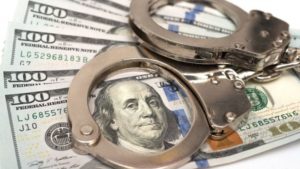
Ukrainian President Volodymyr Zelensky has proposed introducing criminal liability in the form of jail terms from five to 10 years for illegal enrichment and for changing the procedure of confiscating illegally obtained property from officials.
Corresponding presidential bill (No.10358) on amending some legislative acts regarding the confiscation of illegal assets of persons authorized to perform the functions of the state or local self-government and punishment for acquiring such assets was submitted to parliament on Monday. The text of the document was published on the parliament’s website on Tuesday.
For an official acquiring assets worth more 12,000 non-taxable minimum incomes of citizens exceeding his income, the bill proposes punish with imprisonment from five to 10 years with the deprivation of the right to hold certain positions or engage in certain activities for up to three years.
Corresponding Article 3685 “Illegal enrichment” is proposed to be introduced into Ukraine’s Criminal Code.
The draft law proposes amendments to the procedure for filing a claim for recognition of unjustified assets and their recovery into state revenue. The corresponding lawsuit will be filed by a representative of the National Anti-Corruption Bureau of Ukraine (NABU) in coordination with the Specialized Anti-Corruption Prosecutor’s Office (SAPO).
Current legislation provides that a lawsuit on the recognition of assets as unfounded may be brought against an official, in respect of whom a court conviction entered into legal force for committing a corruption offense or legalizing proceeds from crime. Under the current law, prosecutor takes measures to establish property to whom there is evidence that the person involved in the case received it, uses or disposes of it.
The new edition of this provision provides that a lawsuit is filed against unjustified assets received after the entry into force of the law, if it is enacted, and also within three years before the law enters into force, if the difference between the value of the assets and the official’s income exceeds 500 or more times the size of the subsistence minimum for able-bodied citizens.
Cases on the recognition of unjustified assets and their recovery in state revenue will be investigated by the Supreme Anti-Corruption Court.